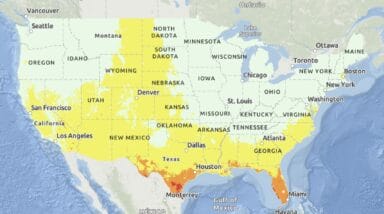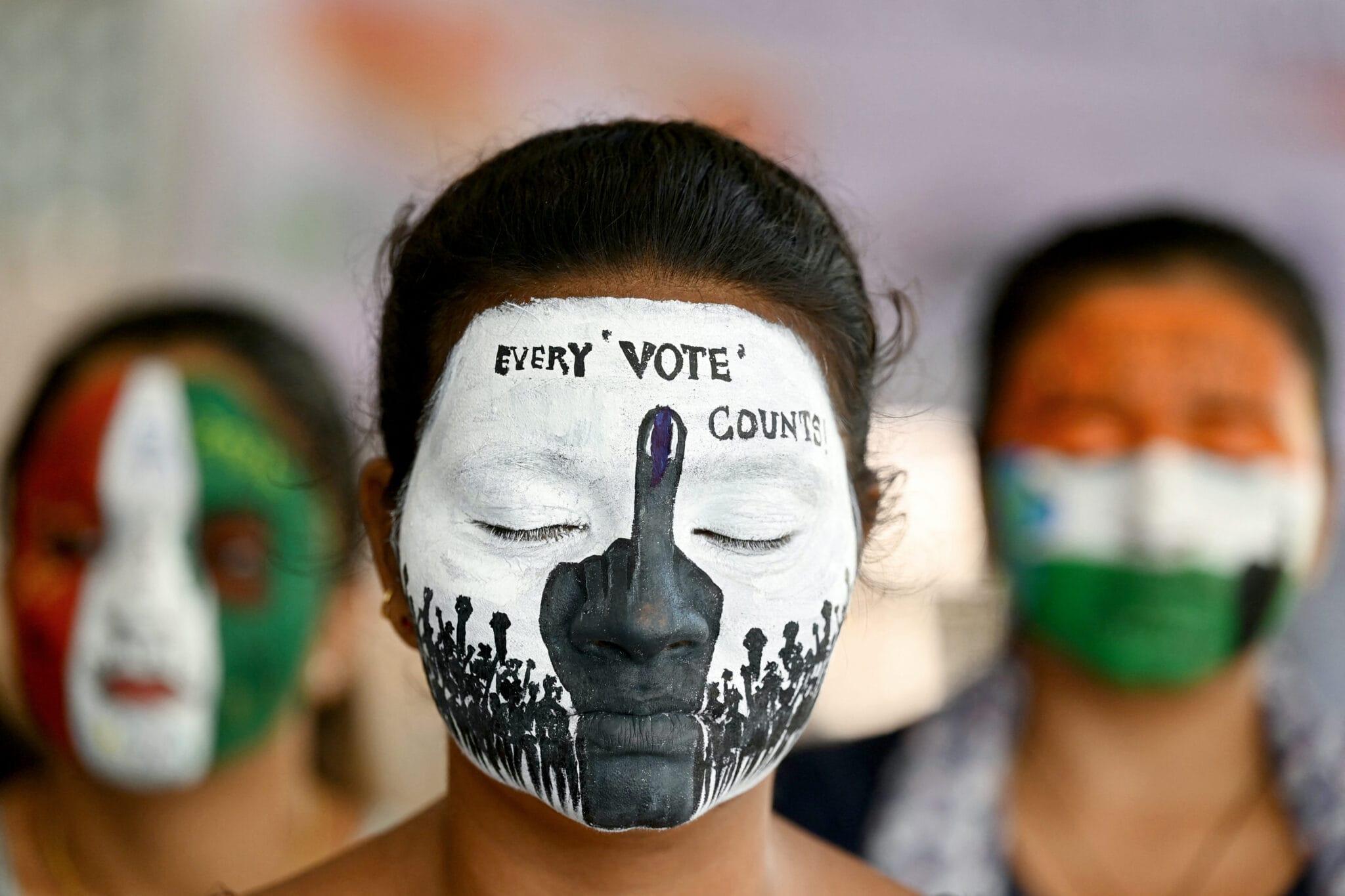India, the world’s third largest annual emitter of greenhouse gases, will conclude its extended election season on June 1, as temperatures across much of the country have been ferociously hot in recent weeks, nearing 50 degrees Celsius (122 degrees F). The heat has led to school closings and brutal conditions for outdoor workers, the elderly, children, people with disabilities, and the poor. Journalists have an opportunity — even a responsibility — to explain why this is happening and what can be done to stop it, especially during this crucial election year.
The absence of climate change from elections coverage around the world illustrates “the tyranny of the immediate,” meaning that “breaking news tends to muscle out other scheduled programming.” In India, as elsewhere, the economy and democracy rightly remain top issues. But, despite the searing temperatures this month, many Indian politicians are ignoring climate and most mainstream elections coverage has made little mention of the crisis. (The situation’s hardly better in the US, where elections will be held in November.)
Election coverage needs to remind voters, and candidates, that the climate crisis grows more dangerous by the day — but also that humanity already has the knowledge and most of the technology needed to solve climate change. That includes holding politicians accountable for doing what science says is needed: a rapid phase-out of oil, gas, and coal.
Elections have just passed or are fast approaching in four more of the world’s leading greenhouse gas emitters: South Africa (May 29), Mexico (June 2), the European Union (June 6-9), and the United Kingdom (July 4). In Mexico, one of the world’s largest oil producers, reporters should be pressing frontrunner Claudia Sheinbaum to square her expertise as a climate scientist with her refusal to endorse a transition away from oil production by Mexico’s state-owned petroleum company, Pemex (Petróleos Mexicanos). There are urgent climate questions to ask in advance of the UK’s elections as well, where prime minister Rishi Sunak’s conservative government has endorsed an expansion of oil and gas production in the North Sea.
Meanwhile, Le Monde reported this week that environmental issues have been all but absent from campaigns for the EU parliamentary elections. Le Monde deserves praise for raising the issue. There’s still time for other news organizations to step up as well — to remind voters and candidates alike that these elections will shape humanity’s climate future.
From Us
War and climate. Watch a recording or read the transcript from “War and Climate Change,” a one-hour CCNow press briefing that explored how conflict and climate are linked. Panelists were Neta C. Crawford, Montague Burton Professor at University of Oxford and the Co-director of the Costs of War Project; Rawan Damen, Director General of Arab Reporters for Investigative Journalism; and Ellie Kinney, Campaign Coordinator at the Conflict and Environment Observatory. Giles Trendle, co-chair of CCNow’s steering committee and former managing director of Al Jazeera English, moderated. Watch.
The Climate Station. CCNow’s free training program for US local TV producers, reporters, and meteorologists is available in English and Spanish. Apply here.
View this post on Instagram
Noteworthy Stories
Sweltering days. Human-caused climate change added an average of 26 days of extreme heat over the last year, according to a report by the Red Cross Red Crescent Climate Centre, World Weather Attribution, and Climate Central. The study found 76 extreme heat episodes over the past year affecting people in 90 countries. By Raymond Zhong at The New York Times…
Climate impacts. Mexico is suffering from an ongoing heatwave and drought as well as a water shortage in its capital, Mexico City. Across the world, Northern India is experiencing an oppressive heatwave, reports Shiv Aroor at India Today.
Aroor gives depth to this report by highlighting those most vulnerable to the heat, such as the poor and migrants, reminding viewers “this isn’t just a temperature story,” and providing critical health guidelines to stay safe.
WHO heatwave guidelines: Here is all you need to know! Tune in#WHO #Heatwave #guideline #5Live @shivaroor pic.twitter.com/RFgLT8TxDe
— IndiaToday (@IndiaToday) May 29, 2024
Indigenous rights. Respecting the land rights and autonomy of Indigenous Peoples and local communities leads to better conservation outcomes, according to a new analysis of 648 studies published in One Earth. This also led to higher incomes and improved social relations. By Anita Hofschneider at Grist…
Clean energy delays. In Fort Mohave, Ariz., a local utility is pushing for a new gas-fired power plant rather than one powered by solar, despite local opposition. The situation in Fort Mohave “underscores the influence of misinformation, culture wars and local politics threatening to delay the US’s transition to renewable energy sources,” writes Nina Lakhani for the Guardian…
Climate crimes. A majority of likely US voters (62%) believe fossil fuel companies “should be held legally accountable for their contributions to climate change,” and about half support criminal charges, according to a new poll by Data for Progress. By Edward Carver at Common Dreams…
Resources

Source: National Weather Service
HeatRisk tool. The US National Weather Service’s new HeatRisk tool forecasts potentially dangerous heat that could harm people’s health using weather, climate, and health data. WUFT in north-central Florida and the Guardian have reported on the tool.
Climate’s fingerprint. Climate Central’s Climate Shift Index measures climate change’s influence on day-to-day weather. On May 29, for example, Miami’s Climate Shift Index was five, meaning Wednesday’s daily average temperature in Miami was at least five times more likely to occur as a result of human-caused global warming.
Fossil finance. Fossil Fuel Finance Hub has tools, databases, and more for researching the banks, insurance companies, private equity firms, and asset managers supporting the fossil fuel industry. The Hub is a project by LittleSis, Rainforest Action Network, Private Equity Climate Risks, and Vanguard SOS.
Industry News
Simulating solutions. WHYY News Climate Desk and WHYY Education Department are holding an in-person event, “Solving the Climate Crisis,” next week where teens will work with newsroom reporters to solve a simulated environmental crisis and conduct interviews.
Collaboration. The Associated Press has new content sharing agreements with five nonprofit newsrooms: CalMatters, Honolulu Civil Beat, Montana Free Press, Nebraska Journalism Trust, and South Dakota News Watch. It’s “part of an effort to expand the reach of local news ahead of the 2024 U.S. presidential election and increasing access to AP’s nonpartisan journalism, especially in communities that may have limited access to fact-based news,” according to an AP press release.
Events
Photoville. As part of the annual Photoville Festival in New York City, Diversify Photo and the Pulitzer Center will feature the work of three photographers in the exhibition “Eyewitness: Shadows of Climate Change.” June 1-13. Learn more.
#BeatTheHeat. Sunday, June 2, is Heat Action Day, dedicated to raising awareness about extreme heat and how to stay safe.
UN climate conference. Signatories to the UN Framework Convention on Climate Change will meet at the Bonn Climate Change Conference 2024 in Bonn, Germany. June 3-13. Learn more.
Oil accountability. Public Citizen, Union of Concerned Scientists, and Fair and Just Prosecution are holding a panel discussion “Prosecuting Big Oil for Climate Crimes,” on June 4. RSVP.
Water crisis. The University of Rhode Island’s Metcalf Annual Lecture Series is holding an event, “Listening to Water: How We Can Thrive in a Time of Drought and Deluge,” on June 6. RSVP.
Visualizing floods. Climate Central is holding an online event, “FloodVision: Edge of America Tour Launch,” to unveil its new FloodVision® tool, which uses artificial intelligence to “generate photorealistic flood and sea level rise visualizations.” June 7. RSVP.
EU elections. Clean Energy Wire will hold an event, “CLEW Press Club: What’s next for energy & climate in Europe?” on June 10. RSVP.
Local Story Ideas
Stories on our radar that local journalists can consider for their own audiences:
- Why is allergy season now longer and more severe? NBC New York uses free graphics from Climate Central to help explain what’s happening.
- Track down which local schools will receive part of the $900 million in funding for clean energy school buses that the US Environmental Protection Agency announced this week. The Detroit News looks at where the money will go in Michigan.
- Explain the connection between climate change and extreme weather. Deutsche Welle examines the climate connection to three major weather events this year.
Jobs, Etc.
Jobs. Axios is hiring an energy/climate policy reporter. The Baltimore Banner is recruiting a photojournalist. The National Catholic Reporter is hiring a news editor (remote). States Newsroom is recruiting a national technology reporter.
Grants. Earth Journalism Network is accepting applications for “Story Grants on the Gendered Impacts of — and Responses to — the Environmental and Climate Crises in Asia Pacific.” Apply by June 12.
Awards. The European Commission is accepting applications for the 2024 Lorenzo Natali Prize. Apply by June 30.
Summer academy. Clean Energy Wire is accepting applications for its Summer Academy on climate journalism and energy for European journalists, September 1-8. Apply by July 1.
Correction: A previous version of the Climate Beat named Petrobras as Mexico’s state-owned petroleum company. The company is actually Pemex (Petróleos Mexicanos). The above copy has been corrected.
